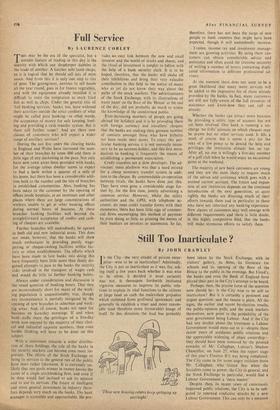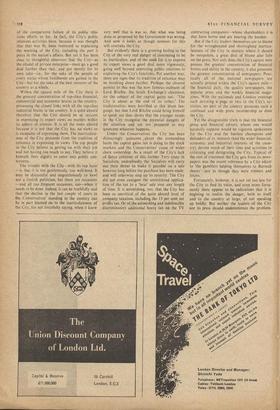Still Too Inarticulate ?
CRAWLEY By JOHN Ts the City—the very citadel of private enter- I prise—wise to be so inarticulate? Admittedly, the City is not so inarticulate as it was, for, ask- ing itself a few years back whether it was wise to be silent, it decided it most certainly was not. It thereupon forthwith instituted vigorous measures to improve its public rela- tions to explain its vital functions to the citizens at large (and so curb the malevolent prejudice which stemmed from profound ignorance), and generally to establish a truer and more reason- able (and therefore more favourable) image of itself. In this direction the lead has probably 'These new housing estates keep springing up overnight.'
been taken by the Stock Exchange, with its visitors' gallery, its films, its literature for schools and its opening of the floor of the House to the public in the evenings. But Lloyd's, the banks and even the Bank of England have played their part in the City's attempt to be heard.
Perhaps, then, the precise form of the question now should be: is the City wise to be still so inarticulate? But it is certainly a pertinent and urgent question; and the reason is plain. All the signs, the earlier and recent by-election results, the public-opinion polls, and the stock markets themselves, now point to the probability of the next government being Labour. And if the City had any doubts about the treatment a Labour Government would mete out to it--despite these recent years of assiduous public relations and the appreciable widening of share ownership— they should have been removed by the pointed remarks of Mr. Callaghan, Labour's Shadow Chancellor, on June 27, when the report stage of this year's Finance Ell was being completed. The City came in for some angry criticism from Mr. Callaghan, who hinted that when the Socialists come to power, the City in general, and the Stock Exchange in particular, would find a Labour Government a 'stern master.'
Despite, then, its recent years of consciously improved public relations, the City is to be sub- jected to renewed vindictive attacks by a new Labour Government. This can only be a measure
of the comparative failure of its public rela- tions efforts so far. In fact, the City's public relations activities have, because it was thought that that was fit, been restricted to explaining the working of the City, including the part it pldys in the nation's affairs. But yet it has been clear to thoughtful observers that the City—as the citadel of private enterprise—must go a good deal further than that, and not merely for its own sake—i.e., for the sake of the people of every status whose livelihoods are gained in the City—but for the sake of the best interests of the country as a whole.
Within the square mile of the City there is the greatest concentration of top-class financial, commercial and economic brains in the country, possessing the closest links with all the top-class industrial brains in the country. It is quite absurd therefore that the City should be so reticent in expressing its expert views on matters within its sphere of interest. It is all the more absurd because it is not that the City has no views or is incapable of expressing them. The inarticulate- ness of the City proceeds from the tradition of reticence in expressing its views. The top people in the City believe in getting on with their job and not having too much to say. They believe it beneath their dignity to enter into public con- troversy.
The trouble with the City—with its top layer —is that it is too gentlemanly, too well-bred. It may be distasteful and ungentlemanly to bawl out a foolish politician, but there are occasions —and all too frequent occasions, too—when it needs to be done. Indeed, it can be truthfully said that the decline in the last couple of years in the Conservatives' standing in the country can be in part blamed on to the inarticulateness of the City, for not forcefully saying, when it knew very well that is was so, that what was being done or proposed by the Government was wrong. And now it looks as though nemesis for this will overtake the City.
But evidently there is a growing feeling in the City of the very real danger of continuing to be so inarticulate, and of the need for it to express its expert views a good deal more vigorously, going well beyond restricting public relations to explaining the City's functions. Put another way, there are signs that its tradition of reticence may be breaking down further. Perhaps the clearest pointer to this was the now famous outburst of Lord Ritchie, the Stock Exchange's chairman, on the subject of the capital gains tax: 'The City is about at the end of its tether.' The traditionalists were horrified at this blunt lan- guage, but that Lord Ritchie could bring himself to speak out thus shows that the younger minds in the City recognise the potential dangers of the situation and are not prepared to stay quiescent whatever happens.
Under the Conservatives the City has been dismayingly quiescent ,about the tremendous harm the capital gains tax is doing to the stock markets and the Conservatives' cause of wider share ownership. As a result of the City's lack of fierce criticism of this further Tory essay in Socialism, undoubtedly the Socialists will carry out their threat to make it payable on a sale however long before the purchase has been made, and will otherwise step up its severity. The City did not even castigate the unrestricted applica- tion of the tax to a 'bear' sale over any length of time. It is astonishing, too, that the City has been so uncritical of the quite absurd level of company taxation, including the 15 per cent net profits tax. Or of the astonishing and indefensible discriminatory additional heavy tax on the TV contracting companies—whose shareholders it is that have borne and are bearing the burden.
But if the City leaders themselves are to blame for the wrongheaded and shortsighted inarticu- lateness of the City in matters where it should be outspoken, a great deal of blame also falls on the press. Not'only does the City's square mile possess the greatest concentration of financial brains and ability in the country, it also possesses the greatest concentration of newspapers. Prac- tically all of the national newspapers are actually printed within the City's square mile— the financial daily, the quality newspapers, the popular press and the weekly financial maga- zines. With the nationals and London evenings each devoting a page or two to the City's ac- tivities, no part of the country possesses such a continual and wide press recordership as does the City.
Yet the disagreeable truth is that the financial press and financial editors, whom one would naturally suppose would be vigorous spokesmen for the City and the fearless champions and defenders of its interests (and the wider financial, economic and industrial interests of the coun- try), devote much of their time and activities to criticising and denigrating the City. Typical of the sort of treatment the City gets from its news- papers was the recent reference by a City editor to 'the gamblers helping themselves to Burmah shares'—just as though they were robbers and felons.
Fortunately, however, it is not yet too late for the City to find its voice, and even more fortu- nately there appear to be indications that it is begining to realise the danger, both to itself and to the country at large, of not speaking up boldly. But neither the leaders• of the City nor its press should underestimate the problem.







































 Previous page
Previous page